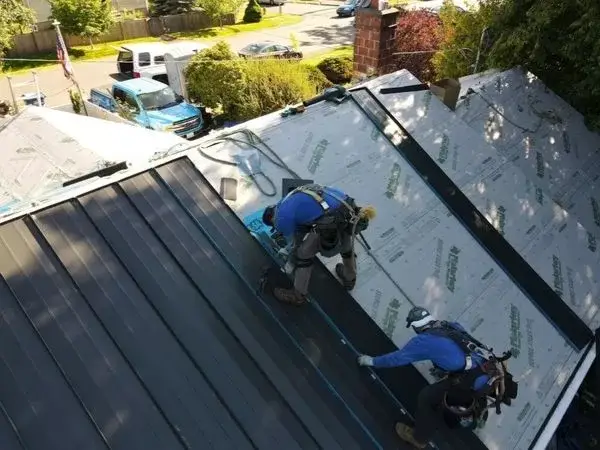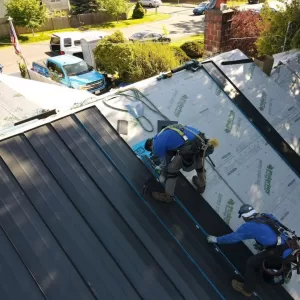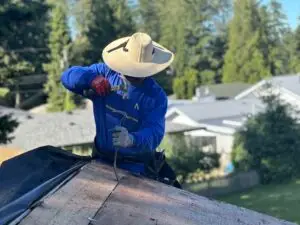5 Common Types of Metal Roofing Materials
Over the past couple of decades, metal roofing has grown in popularity among homeowners looking for a more durable and long-lasting roofing option. Many more homeowners have opted for metal roofs for energy efficiency, fire resistance, or even home insurance benefits.
This comprehensive guide will walk you through five metal roof types, each with its unique advantages. Whether you need a roof replacement or building a new home, this blog will enlighten you on the various types of metal roofing materials so you can decide which option best suits you.
1. Steel Roofing
Steel roofing is probably the most popular and versatile of metal roofs. Essentially, there are two types of steel roofing: galvanized steel and Galvalume steel.
Galvanized Steel
Galvanized steel is covered with a layer of zinc that helps prevent corrosion. Over time, the zinc coating slowly oxidizes and protects the underlying steel from rust, hence increasing the lifespan of the roof.
Galvalume Steel
Galvalume steel provides outstanding rust protection and light reflection, ideal for energy-saving roofs. Although both Galvalume and galvanized steel have similar benefits, Galvalume typically offers better long-term corrosion resistance in most settings.
Pros of Steel Roofs
- Exceptional durability and longevity
- Cheaper than many other metal roofing choices
- Can be recycled when you’re done with it
- Resists rust and corrosion
- Stands up well to bad weather like strong winds and hail
- Doesn’t catch fire easily, which is good for safety
- Doesn’t need much upkeep, saving you time and money
Cons of Steel Roofs
- Possible rusting if the coating is damaged
- Heavy compared to other metal roofing materials and may require additional structural support
Steel roofs are a great deal for what you pay and can be used on all kinds of buildings, from old-fashioned to modern-looking ones. While you might occasionally need to fix a metal roof, you usually don’t have to do it as often as you would with regular roofs made from other roofing materials.
Steel Roof FAQs
Are steel roofs noisy?
Steel roofs aren’t as noisy as most people think. They can be as quiet as any other roof even when it rains or hails heavily with proper installation and insulation.
How can you insulate a steel roof?
Steel roofs can be insulated by placing a layer of insulation materials like foam boards or fiberglass batts underneath them. This insulation helps keep your house warmer in winter months and cool in summer to make your home more comfortable as well as help in saving you some money on energy bills.
How much does steel roofing cost per square foot?
Steel roofing typically costs between $5 to $16 per square foot but the price varies due to factors like the thickness or type of steel (galvanized, galvalume, or stainless). If you want a more budget-friendly option, you might find some steel roofing materials starting as low as $1.50 per square foot, but remember that cheaper isn’t always better when it comes to protecting your home.
How long do steel roofs last?
Steel roofs can last for about 40 to 70 years, which is way longer than regular shingle roofs. But it could last for up to 100 years or more with proper maintenance, especially if you live somewhere with decent weather.
Do steel roofs attract lightning?
No, steel roofs don’t attract lightning any more than other types of roofs. Lightning is typically drawn to the highest point in an area, regardless of the material it’s made of. While metal conducts electricity well, it doesn’t increase the chances of your house being struck by lightning.
2. Aluminum Roofing
Aluminum roofs are quite common in the US roofing market, especially for homeowners in coastal areas where corrosion resistance is of prime importance. This lightweight yet durable material offers several advantages, making it an easy option for many roof replacement and new roof installation projects. Steel roofs are naturally resistant to corrosion, even in salt-spray environments. They also reflect heat easily, offering excellent energy efficiency.
Pros of Aluminum Roofs
- Resistant to corrosion and suitable for coastal properties
- High thermal reflectivity, which helps lower cooling costs
- It is recyclable and eco-friendly
- Lightweight and allows for easier installation and reduced structural requirements
Cons of Aluminum Roofings
- Generally more expensive as compared to steel roofing
- More susceptible to impact dents from hailstorms or falling branches
For homeowners and real estate developers in high-humidity regions, aluminum roofing can be a very good investment. Harsh weather conditions barely affect aluminum roofs, and although the initial costs are higher than some other roofing options, aluminum roofing could be a very significant value investment.
Aluminium Roofs FAQ
How much does an aluminum roof cost?
An aluminum roof usually costs between $4 and $11 per square foot, and you can expect to budget up to $9,000 to $25,000 for an entire house. The price can also vary based on the city where you live, the material quality, and how tricky it is to install.
Are aluminum roofs good?
Yes, they are! They are super lightweight but still tough enough to protect your home, especially in places with lots of rain. Aluminum roofs are also particularly beneficial in homes where epoxy chip flooring is often used, reducing structural stress on the building. They can also help keep your house warm in the scorching summer heat and help you save on some cooling energy bills.
What is the best aluminum roof coating?
Coating aluminum roofs helps reflect sunlight, and protect them from corrosion, and this will ultimately extend their lifespan. A silicone-based aluminum roof coating would offer the best protection because of its UV protection and waterproofing properties. Silicone coatings are preferred for their durability, and flexibility, and can withstand extreme temperatures, making them ideal for long-lasting protection of aluminum roofs.
3. Copper Roofing
Copper roofs have a distinctive appearance, timeless elegance, and unparalleled beauty in architectural design. Copper roofing is durable, functional, and exceptionally resistant to various environmental challenges due to its natural ability to form a protective patina. This distinct feature allows copper roofs to withstand acid rain and even very harsh coastal environments, acid rain, that might otherwise quickly deteriorate lesser durable materials.
Additionally, copper roofs are exceptionally malleable and this allows for custom fabrications for architects looking to create unique roofscapes with a mix of functionality and artistic expression. Copper is also 100% recyclable, an eco-friendly choice for environmentally conscious projects.
Pros of Copper Roofs
- Unique aesthetic appeal that improves with age
- Exceptional durability and functionality
- Natural fire-resistant properties
- Resilience to extreme weather
Cons of Copper Roofs
- More expensive compared to other roofing materials
- Repairs can be costly if anything goes wrong
- Installation can be tricky and requires roofing expertise
Copper Roofs FAQ
What color siding goes with a copper roof?
Copper roofs look great with light-colored siding like white, light gray, or cream color. Other suitable options include earthy tones like tan or beige to match the warm color of copper. If your goal is to create a cool contrast with the copper roof, you can try out dark colors like navy blue or forest green.
How much do copper roofs cost?
Copper roofs are quite expensive, and home roofing projects can range from about $10,000 to over $100,000. You can expect to pay between $13 and $30 per square foot to have one installed.
How long does a copper roof last?
Copper roofs have a lifespan of about 70 to 100 years, but some have even been known to last for over 200 years. Copper roofs are more durable than other types of roofs, which is pretty cool considering you might not have to replace them in your lifetime.
Does copper stop moss on roofs?
Copper roofs are actually really good at preventing moss growth. When copper comes in contact with air and water, it oxidizes and releases copper ions which are toxic to moss, algae, and other plant-like organisms. This prevents moss and algae growth on copper roofs.
4. Zinc Roofing
Many more homeowners keen on environmentally friendly, low-maintenance, and long-lasting roofing options now opt for zinc roofs. These roofs merge strength with sustainability and artistic appearance.
Zinc roofs are recyclable which reduces the environmental impact of roof replacement and disposal. Also, producing zinc roofs requires less energy when compared to many other roofing materials, thus reducing its carbon footprint.
One remarkable feature of zinc roofs is that they produce a protective zinc carbonate patina through a process called chalking (the formation of a whitish residue on roof surfaces caused by the breakdown of the protective paint or coating as a result of exposure to UV rays and other environmental factors. This coating helps protect the underlying metal from further degradation and could even seal scratches or other damages.
Pros
- Very durable, can last for up to 70 years
- Lightweight and requires low maintenance
- Keeps your house warmer in the winter and cozy in the summer
- Fire-resistant and safer for your house
- Can withstand hail and strong winds
- Will gradually corrode over time but rust slower than galvanized steel roofs
- Can prevent moss and algae growth
Cons
- Higher upfront cost compared to steel or aluminum
- Requires skilled installers experienced with zinc roofing
Zinc Roofing FAQs
Are zinc roofs expensive?
Zinc roofs are expensive compared to regular asphalt shingle roofs. They cost between $13 to $25 per square foot which means you should be looking at spending around $15,000 to $24,500 for a zinc roof.
How long does a zinc roof last?
Zinc roofs have a lifespan of 60 to 100 years and their longevity is largely due to zinc’s natural ability to form a protective patina that shields it from weathering and corrosion.
Are zinc roofs noisy?
Zinc roofs are not typically noisier than other roofing materials. The noise level depends on how the roof is installed and the quality of insulation underneath. You can ask your roofers to add extra insulation or use special underlayments if you are worried about the noise.
5. Tin Roofing
Tin roofs are actually made from steel sheets that have a special coating of tin or a tin mixture. This coating functions to protect the steel from rust and makes the roof last much longer.
If you are going for a charming, rustic, and classic look, tin roofs can be your best bet. Tin roofs are quite affordable compared to other fancy roofing materials, and this makes them a decent choice for people who want to give their home a perfect balance between old-school and modern but don’t want to spend a ton of money.
Tin roofing has a long history in American architecture. It was super popular on farms and in small towns, dating back to the 19th century. This long history is why tin roofs make people feel nostalgic like they’re stepping back in time.
Tin roofs are also quite tough. They can handle strong winds, heavy rain, and even some hail. One cool thing about tin roofs is the musical soft pitter-patter sound of raindrops, which is how they sound when it rains.
Pros of Tin Roofs
- Quite affordable when compared to other fancy roofs
- Can withstand strong winds and heavy rain
- Lightweight which reduces the risk of structural damage over time
- Fire-resistant, which is awesome for safety
- Easy to fix if it is damaged
- Can be recycled, so it’s good for the environment
Cons of Tin Roofs
- Less resistant compared with other metal roofing materials.
- Might be tricky to install for non-professional roofers
- Gets hot in the summer months
- Might need extra insulation to keep your house warm
Factors To Consider When Deciding on Metal Roofing
1. Weather Conditions
Different metals work better in specific climates. Do some research, and know the climatic conditions of your home before deciding on your preferred metal roof.
2. The Architectural Style of Your House
When choosing a roof for your house, it’s important to pick a material that matches how your house looks from the outside. For example: If your house has a modern, simple style, a smooth metal roof made of zinc or copper might look great. For an older house that you’re fixing up, a tin or aluminum roof could be perfect.
3. Budget
Metal roofs might cost more at first, but they’re usually a smart choice in the long run. Think about it this way: even though you pay more upfront, you will most likely save money over time. Metal roofs are tough, so they last longer. They also help cut down on energy bills because they keep your house cooler. You won’t have to spend as much on roof repairs over the years. So, when you’re deciding, remember to look at both the starting price and all the money you could save later on.
4. Energy Saving Potential
If you want to prioritize saving energy, go for metals that reflect sunlight better. Metal roofs with light-colored or specially formulated cool-roof coatings have higher solar reflectance and thermal emittance and will help you save on energy bills down the line.
5. Maintenance
All roofs require some maintenance, but certain metals like zinc and copper boast very low maintenance needs, which can be a huge plus over time.
6. Local Building Laws and Regulations
Always consider local building codes and homeowners association rules when determining your choice of roofing material.
7. Installation Expertise
Metal roofs aren’t particularly cheap so if you want the best value for your investments, don’t try to save money by hiring just anyone. Hire a professional roofing company near you with great reviews who know what they are doing and can provide a workman guarantee on their jobs. Also, seek your roofer’s professional advice if you are concerned about the noise during heavy rainfall or a hailstorm. In most cases, they might recommend installing extra insulation or a special underlayment to help keep things quiet.
8. Future Plans
If you are building an investment property, you could install the most in-demand and affordable metal roof. But if this is your forever home, investing in quality materials such as copper and zinc will be one of the best ways to invest your money, since they will outlive you, with minimal maintenance.
Conclusion
The world of metal roofing is full of so many different options that have various benefits and things you can consider. However keep in mind that while the initial cost of metal roofs for homes can be higher compared to regular materials, the long-term benefits far outweigh the cost. If you are considering a metal roof for your home in Seattle, Bellevue, or anywhere in the Puget Sound area, don’t hesitate to reach out to us. Our metal roofing experts are happy to hear all about your project and preferences and recommend a durable, efficient, and budget roofing solution





